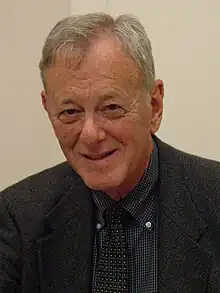Melvin I. Urofsky
Melvin I. Urofsky is an American historian, and professor emeritus at Virginia Commonwealth University.[1]
Melvin I. Urofsky | |
|---|---|
 Urofsky in 2009 | |
| Academic background | |
| Education | |
| Academic work | |
| Discipline | Legal history |
| Institutions | |
He received his B.A. from Columbia University in 1961 and doctorate in 1968.[2] He also received his JD from the University of Virginia.[3] He teaches at American University and George Washington University Law School.[4][5]
Works
- Big Steel and the Wilson Administration: A Study in Business-Government Relations, Columbus, Ohio: Ohio University Press, 1969. OCLC 1131951106
- The Supreme Court Justices: A Biographical Dictionary, London: Routledge, 1994. ISBN 9780815311768
- American Zionism from Herzl to the Holocaust, Lincoln Univ. of Nebraska Press, 1995. ISBN 9780803295599
- Louis D. Brandeis: A Life, New York: Pantheon Books, 2009. ISBN 9780375423666[6]
- Dissent and the Supreme Court: Its Role in the Court's History and the Nation's Constitutional Dialogue, New York: Pantheon Books, 2015. ISBN 9780307379405
- The Affirmative Action Puzzle: A Living History from Reconstruction to Today, Pantheon 2020, ISBN 9781101870877 [7][8][9]
References
- "Melvin I. Urofsky | Penguin Random House".
- Meyer, Eugene. "Melvin I. Urofsky '61 Sets the Bar for Studying Brandeis".
- "Melvin I. Urofsky '61 | Columbia College Today".
- "Adjunct Professor". American University. Retrieved 2020-08-11.
- "Melvin I. Urofsky". www.law.gwu.edu. Retrieved 2022-07-14.
- Liptak, Adam (2009-09-20). "How Brandeis, Revered or Hated, Became a Giant of the Supreme Court". The New York Times. ISSN 0362-4331. Retrieved 2020-02-11.
- Patterson, Orlando (2020-01-30). "Affirmative Action: The Uniquely American Experiment". The New York Times. ISSN 0362-4331. Retrieved 2020-02-11.
- Patterson, Orlando (2020-02-02). "Affirmative action in US politics". Business Standard India. Retrieved 2020-02-11.
- Menand, Louis (9 January 2020). "The Changing Meaning of Affirmative Action". The New Yorker. Retrieved 2020-02-11.
External links
This article is issued from Wikipedia. The text is licensed under Creative Commons - Attribution - Sharealike. Additional terms may apply for the media files.